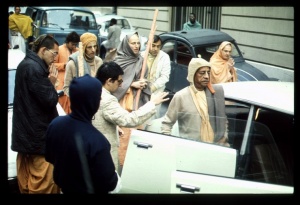SB 4.19.11: Difference between revisions
m (1 revision(s)) |
No edit summary |
||
| Line 1: | Line 1: | ||
{{info | {{info | ||
|speaker=Maitreya | |speaker=Maitreya Ṛṣi | ||
|listener=Vidura | |listener=Vidura | ||
}} | }} | ||
[[Category:Srimad-Bhagavatam - Canto 04 Chapter 19]] | |||
[[Category:Bhagavatam Verses Spoken by Maitreya Rsi - Vanisource|041911]] | |||
<div style="float:left">'''[[Srimad-Bhagavatam]] - [[SB 4|Fourth Canto]] - [[SB 4.19: King Prthu's One Hundred Horse Sacrifices|Chapter 19: King Pṛthu's One Hundred Horse Sacrifices]]'''</div> | |||
<div style="float:right">[[File:Go-previous.png|link=SB 4.19.10]] '''[[SB 4.19.10]] - [[SB 4.19.12]]''' [[File:Go-next.png|link=SB 4.19.12]]</div> | |||
{{RandomImage}} | |||
==== TEXT 11 ==== | ==== TEXT 11 ==== | ||
<div | <div class="verse"> | ||
carameṇāśvamedhena | :carameṇāśvamedhena | ||
yajamāne yajuṣ-patim | :yajamāne yajuṣ-patim | ||
vainye yajña-paśuṁ spardhann | :vainye yajña-paśuṁ spardhann | ||
apovāha tirohitaḥ | :apovāha tirohitaḥ | ||
</div> | </div> | ||
| Line 16: | Line 22: | ||
==== SYNONYMS ==== | ==== SYNONYMS ==== | ||
<div | <div class="synonyms"> | ||
''carameṇa''—by the last one; ''aśva-medhena''—by the aśvamedha sacrifice; ''yajamāne''—when he was performing the sacrifice; ''yajuḥ-patim''—for satisfaction of the Lord of yajña, Viṣṇu; ''vainye''—the son of King Vena; ''yajña-paśum''—the animal meant to be sacrificed in the yajña; ''spardhan''—being envious; ''apovāha''—stole; ''tirohitaḥ''—being invisible. | |||
</div> | </div> | ||
| Line 23: | Line 29: | ||
==== TRANSLATION ==== | ==== TRANSLATION ==== | ||
<div | <div class="translation"> | ||
When Pṛthu Mahārāja was performing the last horse sacrifice [aśvamedha-yajña], King Indra, invisible to everyone, stole the horse intended for sacrifice. He did this because of his great envy of King Pṛthu. | When Pṛthu Mahārāja was performing the last horse sacrifice [aśvamedha-yajña], King Indra, invisible to everyone, stole the horse intended for sacrifice. He did this because of his great envy of King Pṛthu. | ||
</div> | </div> | ||
| Line 30: | Line 36: | ||
==== PURPORT ==== | ==== PURPORT ==== | ||
<div | <div class="purport"> | ||
King Indra is known as śata-kratu, which indicates that he has performed one hundred horse sacrifices (aśvamedha-yajña). We should know, however, that the animals sacrificed in the yajña were not killed. If the Vedic mantras were properly pronounced during the sacrifice, the animal sacrificed would come out again with a new life. That is the test for a successful yajña. When King Pṛthu was performing one hundred yajñas, Indra became very envious because he did not want anyone to excel him. Being an ordinary living entity, he became envious of King Pṛthu, and, making himself invisible, he stole the horse and thus impeded the yajña performance. | King Indra is known as ''śata-kratu'', which indicates that he has performed one hundred horse sacrifices (''aśvamedha-yajña)''. We should know, however, that the animals sacrificed in the ''yajña'' were not killed. If the Vedic ''mantras'' were properly pronounced during the sacrifice, the animal sacrificed would come out again with a new life. That is the test for a successful ''yajña.'' When King Pṛthu was performing one hundred ''yajñas'', Indra became very envious because he did not want anyone to excel him. Being an ordinary living entity, he became envious of King Pṛthu, and, making himself invisible, he stole the horse and thus impeded the ''yajña'' performance. | ||
</div> | </div> | ||
__NOTOC__ | |||
<div style="float:right; clear:both;">[[File:Go-previous.png|link=SB 4.19.10]] '''[[SB 4.19.10]] - [[SB 4.19.12]]''' [[File:Go-next.png|link=SB 4.19.12]]</div> | |||
__NOTOC__ | |||
__NOEDITSECTION__ | |||
Revision as of 10:44, 21 May 2021

A.C. Bhaktivedanta Swami Prabhupada
TEXT 11
- carameṇāśvamedhena
- yajamāne yajuṣ-patim
- vainye yajña-paśuṁ spardhann
- apovāha tirohitaḥ
SYNONYMS
carameṇa—by the last one; aśva-medhena—by the aśvamedha sacrifice; yajamāne—when he was performing the sacrifice; yajuḥ-patim—for satisfaction of the Lord of yajña, Viṣṇu; vainye—the son of King Vena; yajña-paśum—the animal meant to be sacrificed in the yajña; spardhan—being envious; apovāha—stole; tirohitaḥ—being invisible.
TRANSLATION
When Pṛthu Mahārāja was performing the last horse sacrifice [aśvamedha-yajña], King Indra, invisible to everyone, stole the horse intended for sacrifice. He did this because of his great envy of King Pṛthu.
PURPORT
King Indra is known as śata-kratu, which indicates that he has performed one hundred horse sacrifices (aśvamedha-yajña). We should know, however, that the animals sacrificed in the yajña were not killed. If the Vedic mantras were properly pronounced during the sacrifice, the animal sacrificed would come out again with a new life. That is the test for a successful yajña. When King Pṛthu was performing one hundred yajñas, Indra became very envious because he did not want anyone to excel him. Being an ordinary living entity, he became envious of King Pṛthu, and, making himself invisible, he stole the horse and thus impeded the yajña performance.